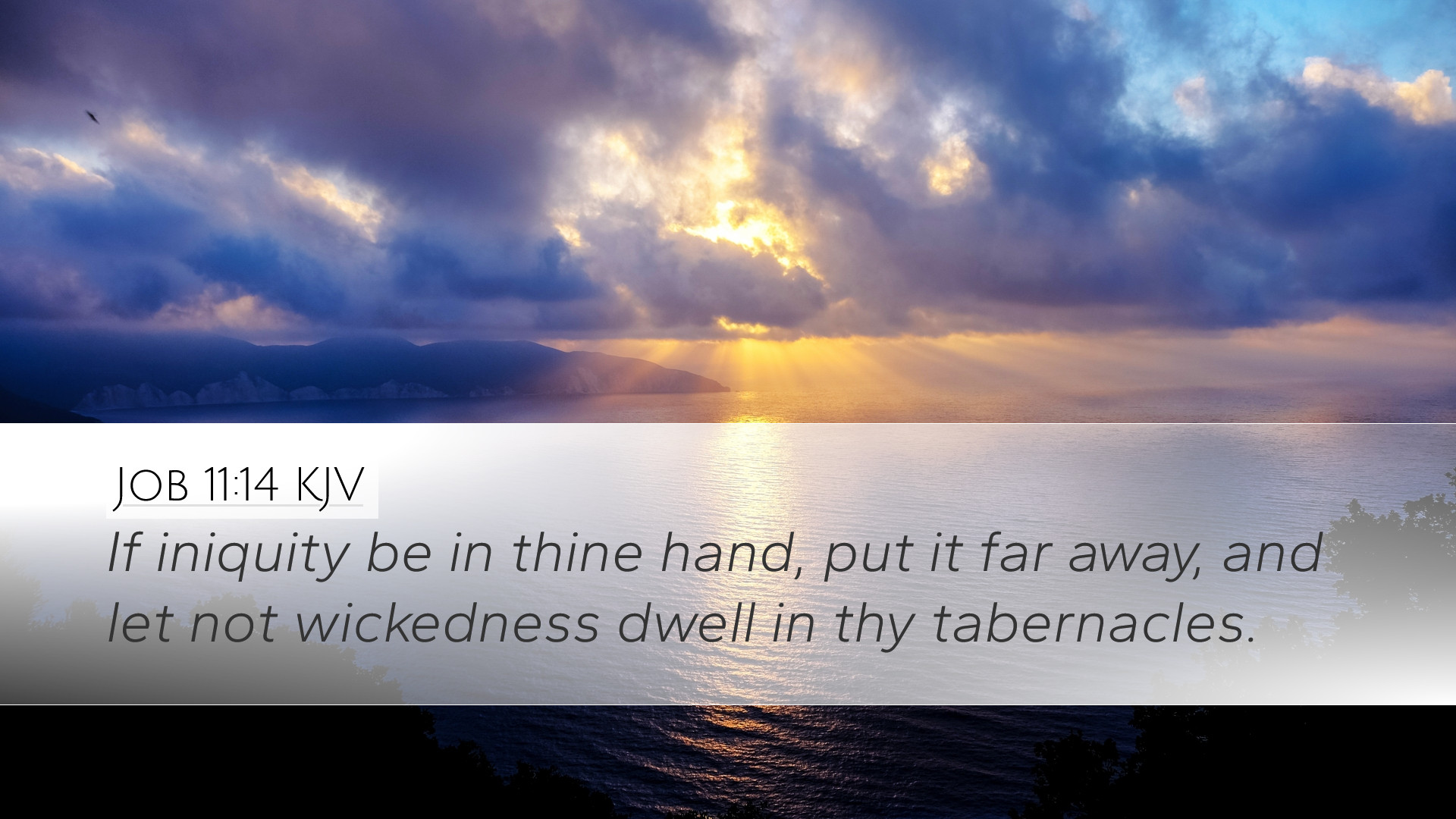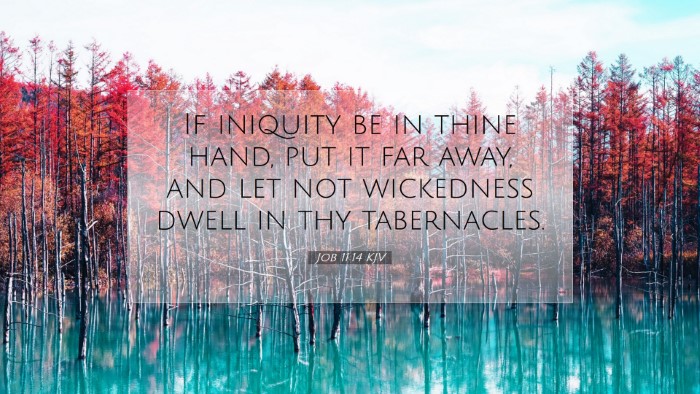Old Testament
Genesis Exodus Leviticus Numbers Deuteronomy Joshua Judges Ruth 1 Samuel 2 Samuel 1 Kings 2 Kings 1 Chronicles 2 Chronicles Ezra Nehemiah Esther Job Psalms Proverbs Ecclesiastes Song of Solomon Isaiah Jeremiah Lamentations Ezekiel Daniel Hosea Joel Amos Obadiah Jonah Micah Nahum Habakkuk Zephaniah Haggai Zechariah MalachiJob 11:14
Job 11:14 KJV
If iniquity be in thine hand, put it far away, and let not wickedness dwell in thy tabernacles.
Job 11:14 Bible Commentary
Commentary on Job 11:14
Verse: Job 11:14 - "If iniquity be in thine hand, put it far away, and let not wickedness dwell in thy tabernacles."
This verse comes from the discourse of Zophar, one of Job’s friends, who speaks to Job amidst his suffering. Zophar’s remarks are deeply reflective of the prevailing understanding of divine justice, wherein he equates Job’s afflictions with guilt and sin. Here, we seek to explore the theological and practical implications of this scripture as presented in public domain commentaries.
Contextual Understanding
Background: In the Book of Job, a great deal of the dialogue focuses on the suffering of the righteous and the nature of God. Job, a man described as "blameless" and "upright," suffers immense losses, prompting discussions among his friends regarding the causes of such affliction.
Insights from Commentary
Matthew Henry: Matthew Henry notes that Zophar’s admonition to Job reflects a common perspective that associates suffering with sin. He interprets the phrase "put it far away" as an invitation for Job to turn from his supposed iniquities. Henry insists that Job’s friends display a lack of compassion, as their theological rigidity prevents them from understanding the true nature of Job’s plight. Additionally, Henry highlights the importance of self-examination, suggesting that before one admonishes another, they must first consider their own state before God.
Albert Barnes: Barnes elaborates further on the nature of iniquity in this verse, drawing attention to the inner condition of the heart. He emphasizes that Zophar calls for an active dealing with sin, illustrating the theological principle that one must take initiative to eradicate wickedness. Barnes asserts that the phrase "let not wickedness dwell" implies a necessity for an ongoing struggle against sin—a notion that resonates in the Christian path of sanctification. He encourages believers to recognize that sin left unchecked leads to spiritual decay, emphasizing the importance of a conscious engagement with one’s moral and spiritual life.
Adam Clarke: Clarke approaches the verse with a focus on the metaphorical implications of ‘tabernacles’—a term that denotes one’s dwelling place or living environment. He posits that wickedness, if allowed to reside within one’s heart (or tabernacle), can contaminate every aspect of life. Clarke suggests that Zophar’s advice, while harsh, also carries a crucial truth about the nature of sin and its effect on the believer's life. He underscores the call to holiness, encouraging readers to proactively seek purity in their lives, allowing no room for sinful practices to take residence in their hearts or lives.
Theological Implications
Sin and Suffering: The association of sin leading to suffering is a recurring theme throughout scripture. In interpreting this verse, it is vital for pastors and theologians to navigate the delicate balance between recognizing personal sin and acknowledging the complexity of suffering. The discourse surrounding this verse invites reflection upon the character of God, suggesting that God's justice and grace are not mutually exclusive.
Grace and Repentance: While Zophar's words appear harsh, Clarke and Henry remind us of the overarching theme of grace and the opportunity for repentance that permeates the biblical narrative. This serves as a critical reminder that God's desire is for restoration rather than condemnation. In similarity, the ministry of Christ emphasizes calling sinners to repentance, underscoring the need for acknowledgment of sin, as well as the assurance of God's forgiveness.
Practical Applications
Self-Examination: This scripture invites believers to engage in self-examination and confession. Pastors can encourage congregants to reflect upon their lives and repent of areas where iniquity may reside. This serves as a practical step towards fostering spiritual growth and intimacy with God.
Community and Accountability: The commentary collectively encourages the establishment of a supportive community where accountability can flourish. Zophar's dialogue, while misguided in its treatment of Job, emphasizes the importance of honest communication regarding spiritual struggles within the body of Christ.
Holiness in Daily Living: There is also a strong challenge to live out holiness in daily activities. The conduct of believers should reflect an active decision to put away wickedness, which requires vigilance and intentionality in discerning and responding to temptations.
Conclusion
Job 11:14 serves as a profound reminder of the necessity of addressing sin in our lives while also reflecting on God’s desire for us to experience His mercy and grace. The insights from Matthew Henry, Albert Barnes, and Adam Clarke collectively call us to a deeper understanding of sin, suffering, and the transformative power of repentance. Ultimately, the call to put away iniquity is not only a preventive measure against sin but also an invitation into the fullness of life that God desires for His people.


